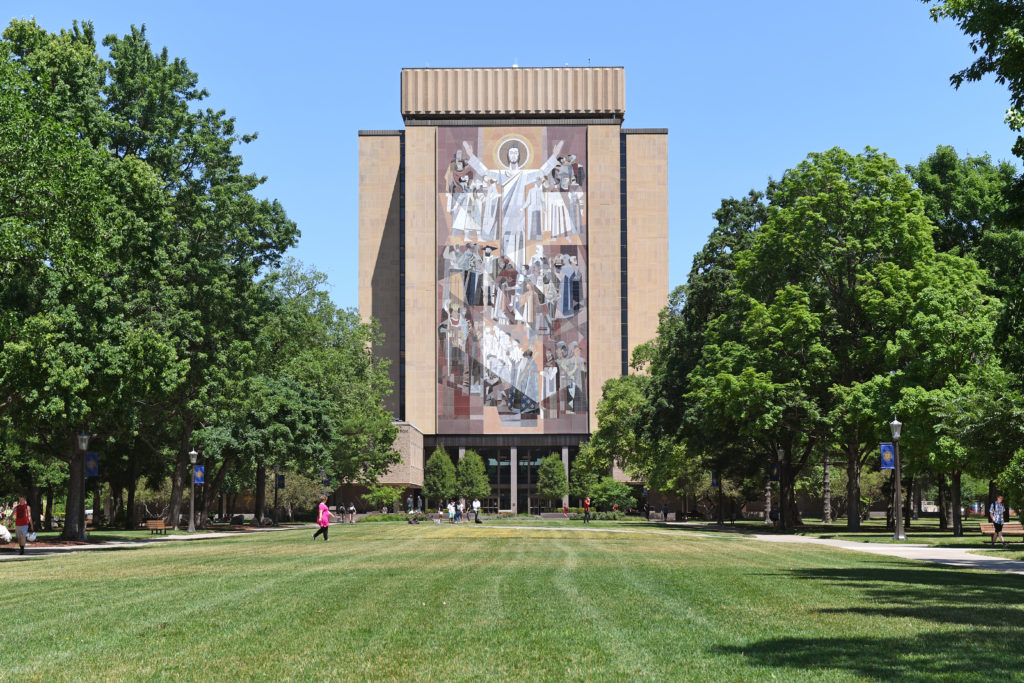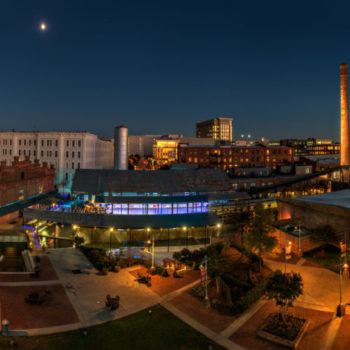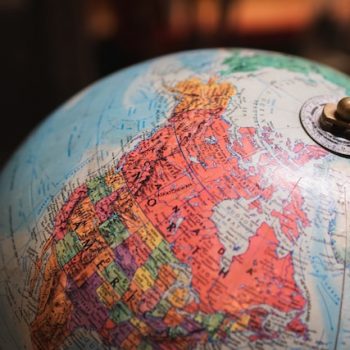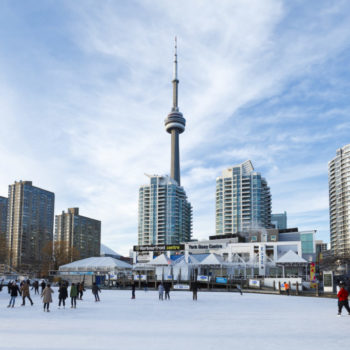
Click here to view South Bend Startup Ecosystem
An Introduction to the South Bend Startup Ecosystem
The greater South Bend Elkhart region encompasses communities within north central Indiana and southwest Michigan. It is a knowledge-driven, highly connected region that serves and provides access to a global innovation economy. In StartupBlink’s 2019 report, South Bend is ranked 219th in the United States and 586th globally.
Historically, the area has been known for producing Studebaker cars, Alka Seltzer, band instruments and recreational vehicles. This is partly due to its central Midwest location which is traversed by major highways, railroad lines, and dark fiber lines. But it can also be attributed to the region’s strong entrepreneurial spirit that still exists today and is evidenced by a growing startup community.
The region makes more than 80 percent of the recreational vehicles purchased each year across the globe and is known for its manufacturing skill. Companies have emerged around its historic industries, but there are a growing number of tech companies that are choosing to start and operate in South Bend.
Historical industrial buildings being redeveloped throughout the region are creating an exciting and unique setting for the region’s up-and-coming innovation districts. To attract the talent the urban cores within the region are building mixed-use housing developments that engage the riverfronts and water amenities. In addition, the region is geographically close to Lake Michigan, Chicago and offers a burgeoning local food scene, minor league and college sporting events, bike trails and plenty of lakes and rivers for water sports.
South Bend-Mishawaka and Elkhart-Goshen, the two largest urban areas in the region, have lower than average costs of living compared to urban areas across the United States. The region’s tax rates are also competitive, particularly in comparison to state rates and other parts of the United States.
The region is attracting investment from Wall Street and potentially Silicon Valley. The low cost of living, plentiful space and access to a range of resources are some of the reasons for this.
Most successful startups in the South Bend Region
The success stories include everything from local startups growing out of manufacturing plants to companies founded on the commercialization of ideas sprouting on campus. In the RV Industry, Lippert Components (@lippertproducts), and Forest River (#forestriver) have grown into two of the largest recreational vehicle companies in the world.
Press Ganey Associates (@pressganey) started after University of Notre Dame professors Irwin Press and Rod Ganey took an interest in using statistics and survey methodology to improve health care. The agency has become one of the leaders in the field and is used by more than 26,000 health care facilities.
More recently, the sale of SMART-Temps, a high growth company that sourced local venture capital to break through into new markets, to Digi International validates the momentum that has been built around smart technology, connection to capital and a vibrant startup community.
Serial entrepreneur Kevin Smith has built several companies and nurtured the rehabilitation of the last remaining Studebaker Factory building, which is now poised to become the Midwest’s largest technology campus. Smith has steered the vision for this project that will transform downtown South Bend and the region. The former Union Station is already home to a regional server center that utilizes densest fiber corridor in the nation underneath the Renaissance District on the former Studebaker campus. The largest carrier hotel and data center in the region, Global Access Point, is already part of the district and there are plans to transform 1.3 million square feet of industrial space and 83 acres into a number of uses.
Ben’s Soft Pretzels (@benspretzels) started in 2008 when Brian Krider, Scott Jones, and Ben Yoder combined a recipe with an aggressive business plan. The business has become one of the fastest-growing franchise companies in the country with 76 locations and plans for more.
Tire Rack (@tire_rack) Pete Veldman opened the first Tire Rack store in 1979 and turned it first into a mail-order tire company and then one that embraced Internet sales. Its headquarters in South Bend cover 2.4 million square feet under roof and features an outdoor test track.
Better World Books (@BWBbooks) Three friends from the University of Notre Dame started selling books online in 2002 to earn extra money and it became a cause-based success. Better World sells used books and gives a portion of the proceeds to literacy efforts worldwide. It’s sold 117 million books, given more than $15 million and diverted more than 73,000 tons of books from landfills. It’s also donated more than 10 million books.
Carved (@carvedllc). In 2011, John Webber formed a company to utilize wood in phone cases and sell them online. As Carved has grown its product line, sales climbed 1,480 percent in three years. It had $2.8 million in sales in 2015 and made the 2016 Inc. 500 list.
Strengths of South Bend Region for startups
The South Bend-Elkhart region has fostered entrepreneurship for decades but is at a key point in its history as dozens of community leaders come together to look at how it can become one of the world’s elite communities for startups. Winning a $42 million state grant to enhance the quality of place and securing a $2.5 million partnership with Elevate Ventures to foster the entrepreneurial ecosystem is just a couple of examples of the region’s focus on attracting talent and supporting entrepreneurs.
Young mayors in the region, including Pete Buttigieg in South Bend, are also focused on livability and making cities more business friendly.
The region’s key strengths include many existing place-based assets, a competitive cost structure, access to markets, higher education resources, and cultural diversity. Innovation districts are also already emerging throughout the region.
The region is home to the University of Notre Dame and other colleges who are collectively educating more than 40,000 students, creating a strong ecosystem to support entrepreneurship and innovation. The commitment by universities to partner with the community and grow its economy is sparking transformational change. The direct and indirect benefits of the University of Notre Dame accounted for more than $1.3 billion in economic activity in the fiscal year 2014 and the university generates more than $16 million in state and local tax revenues.
Notre Dame and IUSB are engaged in scientific discovery and technology commercialization programs. In 2014, 108 inventors produced 65 new disclosures, 33 investors were awarded 24 patents, and 13 technologies representing the work of 19 researchers were licensed. Since 1986, 64 current faculty members have had 166 patents issued.
Notre Dame, in partnership with private and public organizations, recently opened a $36 million Turbomachinery Laboratory in Ignition Park on the edge of downtown South Bend. This facility will be “the nation’s foremost research and test facility for advancing the technology used in the massive gas turbine engines used by commercial and military aircraft, power plants and the oil and gas industry.” General Electric committed $13.5 million to fund research and testing at the lab. Others are working together to install a new 138kV electrical substation to serve the lab and support other technology-driven businesses in the park.
Innovation Park, a 12-acre campus across from Notre Dame, has 55,000 square feet of collaborative space where research, education, and entrepreneurship come together. Based on its early success, an additional 40,000 square feet is under construction. “Since Innovation Park’s opening seven years ago, 59 new ventures have launched there, 29 companies are currently operational, 38 Notre Dame faculty members are working there, 67 Notre Dame student interns are employed by ventures and 15 companies have secured significant outside funding,” according to an August 2016 article in the South Bend Tribune.
The region features hard-working people who connect in vibrant social and civic communities. Strong non-profit agencies strengthen the region, including EnFocus, which helps 17 young innovators work as fellows in the community after finishing their college education.
The region attracts tourists to visit the University of Notre Dame or learn more Amish life and culture. The region’s growing craft beer scene, successful southwestern Michigan wineries and a strong farm to table movement are also attracting both tourists and residents.
Weaknesses of South Bend Region for startups
Historically, the counties in North Central Indiana and Southwest Michigan haven’t thought or talked regionally. County and state lines have acted as barriers as communities seek funding, make plans and govern themselves. The current conversation about the future of the region has reached more deeply into the communities than any previous effort and the energy and commitment to move the region forward as a whole is strong.
The South Bend Elkhart Region benefits from world-class educational institutions and Indiana’s business-friendly environment, yet it needs to grow or attract a tech-savvy workforce and entrepreneurs to establish businesses in new sectors.
Unless a new generation of higher skilled workers emerges, it will lose population and employment density as the existing workforce ages and retires.
Additional investment in amenities will be needed to create recreation spots, trail systems, entertainment venues and transit services. Improved rail service to Chicago with frequent reliable services under 90 minutes is key to the region’s advancement.
The South Bend-Elkhart region is known for being home to Notre Dame, but has yet to become known for its smart, connected communities. Because of its location in the Rust Belt and association with low-skilled manufacturing, changing the perception of the community could take time, but conversations and efforts at a regional level are aimed at doing just that.
Biggest sources for startup news
The region needs more sources for news and reflection its growing startup ecosystem. A regional business journal is no longer active and other magazines in the region tend to focus on lifestyle more than business activities.
The region has a number of weekly and daily newspapers. The largest is the South Bend Tribune, which devotes considerable space to business coverage. The Elkhart Truth and The Goshen News are also daily newspapers.
Inside INdiana Business, a blog that covers the entire state, pays a lot of attention to northern Indiana. Mendoza Business is the biannual publication for alumni of Notre Dame’s Mendoza College of Business.
Edible Michiana does a great job covering the farm-to-table and entrepreneurial food realm for the region.
RV Business is a significant trade publication based in northern Indiana that covers all aspects of the recreational vehicle industry.
Michiana Partnership, which is working at economic development throughout the region, is emerging as one of the key sources for information about meetups, startups and regional efforts.
Biggest players in the South Bend startup ecosystem
- Organisations promoting startups:
The University of Notre Dame has a worldwide reputation for higher education is provides and its role as a Catholic university, but now leadership has become focused on the region and how to improve it. Efforts are expanding quickly to bridge the research happening at the university with business efforts in and around South Bend.
Innovation Park Notre Dame opened in 2009 to help ideas reach the commercial marketplace. Its 54,000 square feet is being expanded because of its success.
Ignition Park is emerging as a tech hub on the grounds where Studebaker Corp. produced its legendary vehicles. The Notre Dame Turbomachinery Laboratory is in the park, as well as four tech companies.
Coworking spaces are in their infancy in the region but are open in four cities across the region. Headquarters at CatalystOne and the 101 Business Building. opened most recently. The Goshen and Elkhart chambers of commerce both have one in their building.
- Influencers in the startup space
Pete Buttigieg (@petebuttigieg), mayor of South Bend, is attracting national attention for his innovative approach to governance. He’s been using data and technology to move this former Rust Belt city forward, hiring coders and using data to track the city’s sewers and save $100 million. He is now running for the chairmanship of the Democratic National Committee and has been mentioned as a possible future presidential candidate.
Tracy Graham (@tgraham27) is founder and CEO of GrahamAllen Partners, South Bend, which has created or invested in six tech companies with the goal of growing reoccurring annual revenue to $100 million. Graham is a veteran in the data and computing sectors and the businesses now include data analysis and cybersecurity.
Jacquie Barton, president, and owner of Specialized Staffing Solutions LLC, created a multimillion dollar staffing company based in South Bend helped find work for 8,000 people in 2016. The business has multiple offices in Indiana and Michigan.
Amish Shah (@asshah) is CEO of KemKrest, a parts supplier to the automotive, agriculture and water sports industries. He was a regional winner of the 2016 Ernst & Young Entrepreneur of the Year contest and has been integral in reviving entrepreneurship education in Elkhart County via Lemonade Day and Junior Achievement.
Scott Welch, CEO of Welch Packaging Group, started in 1985 with four employees and has grown the company to more than 900 employees producing all kinds of paper and cardboard packaging. The company vertically integrated in late 2016 and has been doing an innovative training program for recent college graduates for 20 years.
Isaac Torres founded Intercambio Express in Elkhart in 1999 after having a bad experience wiring money to a family member in Mexico. He wrote a business plan while studying at Indiana University South Bend and created the company that now has more than 1,500 locations in dozens of states.
Scott Morris serves as director of research at the Notre Dame Turbomachinery Laboratory at Ignition Park, where he oversees multiple research projects to improve gas turbine engines and also acoustics.
Sources to know more about the South Bend region startup ecosystem
Michiana Partnership is regularly sending an email newsletter for its activities and there is also a weekly newsletter on the Regional Economic Development Strategy that is underway. The Michiana Partnership website www.SouthBendElkhart.org is a key point of connection.
The South Bend Regional Chamber of Commerce just changed its name and has a new website that covers the region well.
The Regional Development Authority continues to provide information on its activities and Elevate Ventures highlights its ongoing work in the region.
Major startup events in the South Bend region
The sixth annual 1st Source Bank Commercialization Dinner, an event that honors a Notre Dame or Indiana University South Bend professor for transitioning technology from the lab to the marketplace and celebrates the entrepreneurial ecosystem that nurtures the commercialization, will take place on April 18.
Startup Weekend Notre Dame brings together developers, designers, marketers and more to form teams, build products and launch products in a 54-hour event over one weekend. Startup Weekend Michiana also took place in 2015 and is being planned for the fall of 2017.
St. Joe CEO is an entrepreneurship immersion program for 40 area high school seniors that hosts an annual Startup The City event to engage the entire entrepreneurial stack within the region. Students use the money generated at their yearly event as seed funding for their own individual startups that will launch in May each year.
To support college students, St. Joe CEO is launching the Applied Entrepreneurship program that will bring together 20 students from five area universities. Students will run an annual pitch competition in November for the region and will also launch their own startups each May. This is the first program of its kind, bringing together universities and mentors from across the region to positively impact the entrepreneurial ecosystem.
Goshen Pitch Night awards cash and business services to entrepreneurs after giving a five-minute pitch.
McCloskey Business Plan Competition is an annual event that encourages any Notre Dame student to submit a business plan that could win up to a $25,000 to help it launch.
The Entrepreneur Lecture Series at the Indiana University of South Bend annually features 10 lectures on the topic.
Ignite Michiana regularly gathers groups of people to give five-minute talks comprised of 20 slides that advance every 15 seconds.
Entrepreneurs are gathering twice a month in Goshen and South Bend at Regional Innovation Tuesdays to discuss issues they’re facing.
Conclusion
The South Bend Region shows a lot of promise for startups with its myriad advantages and startup enablers. But it needs to develop a more tech-savvy workforce to take its startup ecosystem a step further.
About the writer:
Marshall V. King (@hungrymarshall), writer for Regional Economic Development Strategy, which includes the Entrepreneurship Committee and others. He has done prior work for the Regional Development Authority of North Central Indiana and the Community Foundation of Elkhart County, as well as several startups. King is a longtime community newspaper journalist who is now a freelance writer and photographer covering topics ranging from food to entrepreneurship, RVs to road trips.
Contributors:
Iris Hammel (@irishammel), director of St. Joe CEO, a program teaching high school students how to become entrepreneurs. Bethany Hartley of the program also provided information for this story.
Regina Emberton (@Remberton), president/CEO of Michiana Partnership, has taken a key role in bringing the region together to improve.





